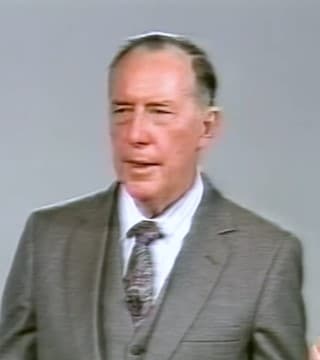Derek Prince - 4 Postures of Worship (01/02/2022)
This excerpt is from: Thanksgiving, Praise and Worship
This is the third and the last in a series of short talks on the theme of thanksgiving, praise and worship. And the theme of this talk will be worship. Let me just remind you how I sought to distinguish between these three related activities. By thanksgiving, we acknowledge God's goodness. By praise, we acknowledge God's greatness. And by worship, we acknowledge God's holiness. I personally believe that worship is the highest activity of which any human being is capable. Praise and thanksgiving are primarily utterances. They come out of our mouths. We speak them or we sing them, or we may even shout them. But worship is not primarily an utterance. This is very important because I find that very few people realize this. But so far as I know, every word that's used in the original language of the Bible for worship, either in the Hebrew of the Old Testament or in the Greek of the New, describes an attitude of the body. Worship is not really an utterance, it is an attitude. Of course, not just an attitude of the physical body. But an attitude of the whole inner being.
There are certain specific attitudes which, in the Bible, are characteristic of worship. First of all, bowing down the head. When Moses came from his interview with God at the burning bush... back to his people in Egypt with the news that God was going to deliver them, and brought this message to the elders, it says they all bowed their heads. They worshiped. That was their first response. It wasn't an utterance. It was an attitude. And then, often, it's not just the head but the upper part of the body. Accompanying that many times is the stretching out of the hands, palms upwards. It's an interesting fact that the Hebrew word for 'thank you', 'toda', is directly related to the Hebrew word for the hand. Hebrew is a very, what would I say?, physical language. It doesn't really indulge in abstracts. It indulges in concretes. So 'thank you' is stretching out the hand. And when we stretch out our hands to God, we're saying 'thank You'. I believe we're also stretching out our hands upward to receive anything... that He wants to impart to us.
And then, kneeling down is a very distinctive attitude of worship. I appreciate the liturgical churches which have retained this practice of kneeling down. Having been brought up in the Anglican Church, I used to know all the times when it was appropriate to kneel. I want to say that I believe kneeling is a very important part of our worship. I think some Charismatics and some Pentecostals are missing out on that. I've been in some meetings where God has brought the meeting to a climax... and I've suggested that the whole congregation kneel. And we've had some of our most powerful visitations of the Holy Spirit... when we're all before God in a kneeling attitude. Of course, I realize it can be simply a religious formality which has lost most of its meaning, but don't let that deprive you of the blessing of kneeling before God.
And then worship is also, and I think this is probably the main word, it means falling prostrate on your face before God. I always smile because I hear lots of people singing that hymn that says, 'Let angels prostrate fall.' And most of the people that sing that would never dream of falling prostrate themselves. It's good enough for angels but don't ask us, dignified human beings, to fall on our faces. There are not many of the great men in the Bible that you could find that didn't, at some time or another, end up with their faces to the ground before God. And this is perhaps the ultimate act of worship.
Generally speaking, when Ruth and I are going to travel on some preaching assignment, we seek to prepare ourselves beforehand. I won't say we always do this, but usually at some point... we will end up prostrate on our faces on the floor before God. A kind of acknowledging: God, we are totally dependent upon you. We have nothing to give, we have no strength, we have no righteousness, we have no wisdom, unless it comes from You. I love those words of John Bunyan. They've always stayed with me. 'He that is down need fear no fall. He that is low, no pride. He that is humble ever shall have God to be his guide.' When you've got to the floor, you can't go any lower. You don't need to fear falling after that. It's a safe position to be flat on your face before God.

